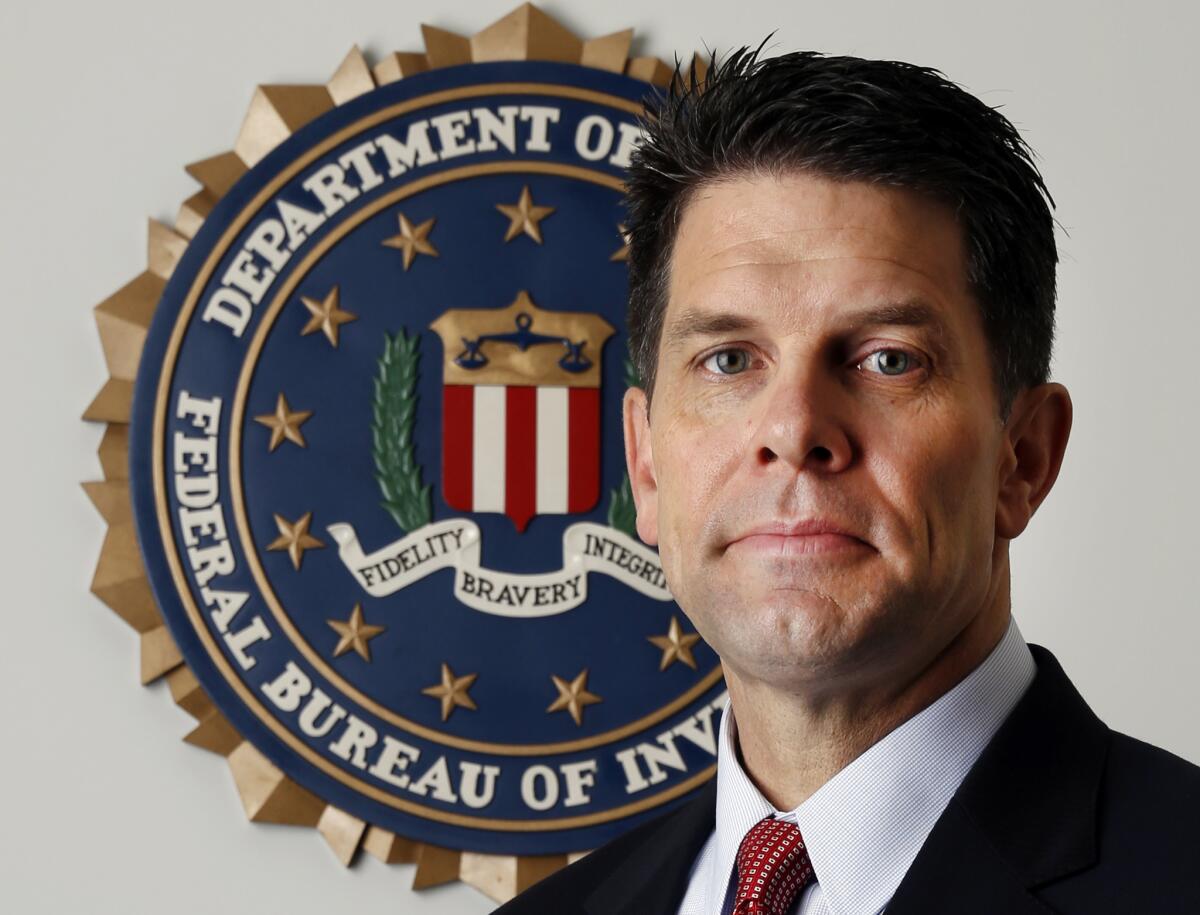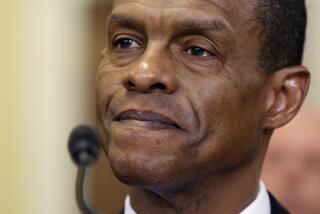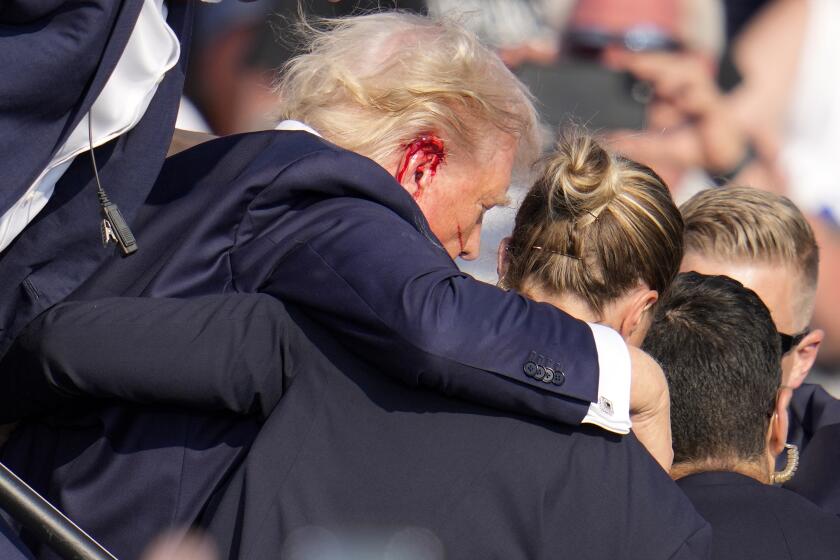Column: The FBI’s man in L.A. on how to find the bad guys among us

David Bowdich, assistant director in charge of the FBI’s L.A. office, oversees the most populous beat in law enforcement — seven Southern California counties, some 44,000 square miles, and nearly 19 million people. He joined the bureau in 1995, and most recently headed the office’s joint counter-terrorism task force, with its myriad local police agencies and a reach as far as terrorist investigations in Southeast Asia. Apart from the daily challenges of terrorism, crime and corruption, Bowdich hopes to create a staff that looks and sounds more like the population around it. To keep an ear to the ground in a place as diverse as this, you have to be able to understand what’s being said.
The East Coast has been singled out repeatedly as a terrorist target; how about Southern California?
That is exactly my concern. Southern California, and in particular Los Angeles, I look at very much as a potential target. You have Hollywood; you just saw it in the cyber realm [with the Sony hack]. I was recently in New York with [Police] Commissioner [William J.] Bratton. He said New York is focused on terrorism because they’ve been hit. Their memory is very long. And they’ve had several plots that have been disrupted since. Los Angeles is a big, big city, and we have some iconic potential targets. My concern is that we not become complacent, because complacency is very dangerous.
A lot of people don’t realize, OK, some 23-year-old guy goes over to fight for Syria, gets battle-hardened, further radicalized and redirected by ISIS [Islamic State] or Al Qaeda to the U.S. Where I lose sleep is, what are we missing? Did we cover this threat to the extent we could?
What should Angelenos do?
You can go to the Department of Homeland Security campaign “See something, say something.” But a lot of it is being connected to your community. One of my priorities is to expand outreach. We have very large immigrant communities here. Many folks come from countries where their version of the FBI is a scary thing, an oppressive group tied to oppressive regime. So part of it is developing trusting relationships. Yes, we will make unpopular decisions and arrest people at times, but the message I need to send to Angelenos is, we are your FBI.
There’s a responsibility — not to spy on your neighbor but to identify those we’re concerned with based on things he’s saying, the actions he’s taking, the social media he’s putting out. People have a right to say what they want, but if it appears they’re getting ready to go fight or conduct some sort of attack, those are a concern.
How has the FBI recently recalibrated its counter-terrorism work — perhaps a 9/11 2.0 mode?
Al Qaeda are down but not out. We’ve seen in the last few years how quickly that threat has metastasized. It’s no longer [only] Al Qaeda; you have Boko Haram, Al Shabab, Asian terrorist groups, Abu Sayyaf in the Philippines, ISIS. We were very war-weary post-Iraq and Afghanistan. However, when people get on TV and decapitate victims or set them on fire, you’re pulling the tail of a very weary tiger. We have quickly adjusted our sights toward the evolving threat.
What’s the appeal of groups such as Islamic State to some people in the U.S.?
The appeal is to the disaffected and/or the mentally ill. Others feel it’s their obligation to go over and fight. All are dangerous.
There was a day when we didn’t deal with mental health issues like we should; the federal system wasn’t set up to deal with that, which is why we leverage our [law enforcement] partners’ resources [now]. We will get calls [about a] person espousing radical rhetoric. We’ll look into it and realize this person has severe mental health issues. [Think of] Newtown, Aurora, Arizona with the congresswoman.
Los Angeles, Minneapolis and Boston are part of a pilot White House initiative called “Countering Violent Extremism.” How does that work?
It’s our recognition that we can’t arrest our way out of this problem. Enforcement and interdiction are a very big part, but there’s also prevention and intervention, where you work with pragmatic, influential community leaders, with mental health professionals. We hope to include counter-messaging to youth; the UK has done tremendous work in this area. That’s going to be a big piece of it because ISIS is very aggressive on social media.
One arrow in your quiver is paid informants, like the one in the case of the four Southern California men facing sentencing for plotting to join terrorist groups overseas.
That’s a hot button with many communities. We have used human intelligence — informants — with some bumps in the road, of course. We will continue to use them. Our job is to find the facts, to disrupt the problem, dismantle the plot. Then the U.S. attorney will present the case, and the jury makes the decision, not us.
Defense attorneys like to say you’re not stopping crime, you’re creating a crime.
That’s a common argument. We do not put ideas into people’s heads.
In 2006, there was controversy over the FBI putting an informant inside an Orange County mosque.
I hear those concerns all the time. What I will say is that it’s historical. I engage with the community — I was with a group of Syrians last night who are very supportive. Do we infiltrate mosques with informants or undercovers? We do not [target] a mosque. We follow a person, that’s it — not the institution, whether it’s a Catholic church, a Baptist church, a synagogue or a mosque.
After 9/11, we heard that federal agencies had to change.
Some culture changes had to occur. Former Director [Robert] Mueller told the story about how he went to see President Bush right after 9/11. He began to tell him all the resources in place at the Pentagon; the World Trade Center; in Shanksville, Pa; and President Bush puts up his hand and says, “I got it. What are we doing to stop the next one?” And that was the sea change the FBI had to make.
We are speaking as news emerges about a massive hack of Anthem insurance. How is the FBI keeping up with cybercrime?
Technology outpaces the law. We have established a national cyber-intelligence joint task force. With these cases, there’s no state lines, not even country lines. We’ve got to hire the right people. There’s [cybercrime agents ] who could probably walk out the door and into extremely lucrative positions because of their acumen. They stick around, and see it as their duty, in national security, in law enforcement. We’re trying to hire [more of] that talent.
The FBI takes on many public corruption cases, from the Los Angeles Sheriff’s Department to the current case against two brothers who are former state legislators.
That’s because if we’re not doing it, a lot of the times it’s not getting done. The investigations are delicate. They’re not easy. On one hand you could potentially be investigating an employee of an agency you’re working with. [But] LAPD Chief [Charlie] Beck and Sheriff [Jim] McDonnell don’t want anyone bad in their organization any more than I do.
As to political corruption, the message sent by the prosecutions should be encouraging to taxpayers. We have a lot of good politicians. When we have allegations of a bad apple, we’ll go after that extremely aggressively. That’s what makes our government different from so many others.
You were a police officer in New Mexico; what do you think about the anti-law enforcement sentiment in the wake of high-profile police shootings?
It’s a very delicate time in law enforcement right now, and how we react and how we engage with communities is so important.
Law enforcement has to evolve with society. This is where recruiting is a big part, to mirror the communities we serve. It takes time and it’s not always easy. L.A. is a perfect example: I have, I believe, five Farsi speakers in this office. I could use more. I could use more of many languages.
Much of the public supports law enforcement a lot more than you actually hear. [But] it’s a perishable relationship. You have to earn that, and when you make mistakes, you have to take it on the chin and make changes.
This is L.A. — so what’s your favorite law enforcement movie?
“The Untouchables.” Eliot Ness’ character was unyielding, tenacious, principled. That describes what a law enforcement professional should be.
This interview has been condensed and edited.
Twitter: @pattmlatimes
Follow the Opinion section on Twitter @latimesopinion and Facebook
More to Read
A cure for the common opinion
Get thought-provoking perspectives with our weekly newsletter.
You may occasionally receive promotional content from the Los Angeles Times.







